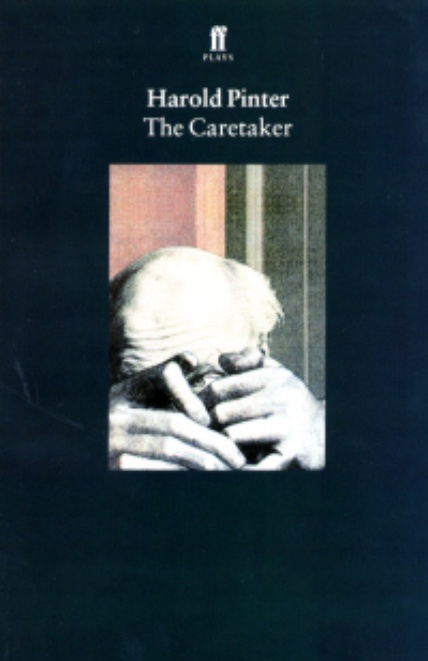Harold Pinter: The Caretaker

As far as I know Harold Pinter, plot and story are usually non-existent in his works, but I write a few lines about what goes on in this play. (I don’t think it really matters here, but I must add that my post contains spoilers.)
So, the play is about two brothers, Mick and Aston. Mick works in the construction industry, and leads an average, moderately pointless life; Aston – through no fault of his own – doesn’t work anywhere, and leads an absolutely pointless life. Mick is the owner of a run-down building, and his plan is that he lets Aston live there, and Aston, in return, renovates the house. At the beginning of the play Aston brings home an old never-do-well, Davies (or perhaps his name is Jenkins), and he offers him a bed to sleep in. Aston wants to help Davies – who is even more screwed-up than him – and he comes up with the idea that perhaps Davies might become the caretaker of the building. Some time later – independently of Aston – Mick also comes to the conclusion that it would be nice if Davies became the caretaker. But finally Davies doesn’t become the caretaker.
Basically, this is it, but of course the story isn’t too important here. What’s important, and what the play is about is the characters’ inability to communicate, their impotence, helplessness, and their all-permeating, almost tragic cluelessness. Each of the three characters is impotent, helpless (etc.) to some extent, but the level of their defencelessness varies greatly.
To understand the level of the characters’ emotional and mental nakedness, it’s worth considering their typical, trademark sentences one by one because these sum up their philosophy in life very succinctly. For instance, Davies, the old idler (who says that he’s a jack of all trades but I’ve got the hunch that in fact he’s a jack of no trades) keeps repeating that as soon as the weather clears he’s going down to a distant London neighborhood to get his identity documents which he had left in the care of an acquaintance ten-odd years ago. Davies argues that all his problems will be miraculously solved once he gets his documents back – for example, he will be able to prove his real name, and he will also be able to prove that he’s the perfect candidate for the caretaker position. Of course, Davies never goes down to Sidcup for his papers, but there’s always a good reason for his inertia – it’s either raining; or it looks as if it’s going to rain; or his shoes are so worn that it’s impossible to take a long walk in them. (But then again – Davies’s constant search for excuses is understandable, given the fact that he probably knows well enough that having his documents on him wouldn’t really change a thing, but as long as he doesn’t have them, he can pretend that his failure in life is due to the missing papers.)
Aston’s philosophy greatly resembles that of the old would-be caretaker: he keeps saying that he will start the renovation of the house by first building a shed in the backyard, and when it’s built, he will be able to get down to the more important tasks. The shed, however, never gets built – Aston’s only noteworthy activity around the house is that he collects junk, and he tries to repair a broken toaster. Aston’s impotence and his constant procrastination arise from the events in his past: as it turns out, he suffers from some mental illness and he was treated with electric shock therapy when he was younger. The treatment left him even worse off, and since then, Aston keeps wandering around in reality and he’s virtually unable to act and think „normally”.
And Mick – even though he lives a more or less „normal” life – is also constantly waiting for the ideal circumstances, and he does virtually nothing to advance his plans. His dream is that one day he will live with his brother in the beautifully redecorated house, and everything will be just fine and idyllic – but presumably he knows that if it’s up to Aston, the house will never be renovated. So the suspicion might arise that perhaps Mick doesn’t really want to live together with his mentally deranged brother.
These underlying thoughts and motivations, naturally, never come to the surface. And even the thoughts that are given voice to are such that the others never understand (or completely misunderstand) them. We might say that The Caretaker is a „typical”, depressing, sickly-funny absurdist play. But the reason why I find it almost unbearably sad and depressing is that The Caretaker – contrary to some really absurd/abstract absurdist plays – is too much like the reality I know. Reading this play broke my heart now – partly because it’s very real, and partly because it’s clear from all the fragmentary, meaningless conversation attempts of the characters that these people basically mean well, and if the need arises they protect and stand up for each other (e.g. Mick doesn’t let Davies dismiss Aston disparagingly) – but in the end, all this good-will, all these plans are for nothing.
So, the play is about two brothers, Mick and Aston. Mick works in the construction industry, and leads an average, moderately pointless life; Aston – through no fault of his own – doesn’t work anywhere, and leads an absolutely pointless life. Mick is the owner of a run-down building, and his plan is that he lets Aston live there, and Aston, in return, renovates the house. At the beginning of the play Aston brings home an old never-do-well, Davies (or perhaps his name is Jenkins), and he offers him a bed to sleep in. Aston wants to help Davies – who is even more screwed-up than him – and he comes up with the idea that perhaps Davies might become the caretaker of the building. Some time later – independently of Aston – Mick also comes to the conclusion that it would be nice if Davies became the caretaker. But finally Davies doesn’t become the caretaker.
Basically, this is it, but of course the story isn’t too important here. What’s important, and what the play is about is the characters’ inability to communicate, their impotence, helplessness, and their all-permeating, almost tragic cluelessness. Each of the three characters is impotent, helpless (etc.) to some extent, but the level of their defencelessness varies greatly.
To understand the level of the characters’ emotional and mental nakedness, it’s worth considering their typical, trademark sentences one by one because these sum up their philosophy in life very succinctly. For instance, Davies, the old idler (who says that he’s a jack of all trades but I’ve got the hunch that in fact he’s a jack of no trades) keeps repeating that as soon as the weather clears he’s going down to a distant London neighborhood to get his identity documents which he had left in the care of an acquaintance ten-odd years ago. Davies argues that all his problems will be miraculously solved once he gets his documents back – for example, he will be able to prove his real name, and he will also be able to prove that he’s the perfect candidate for the caretaker position. Of course, Davies never goes down to Sidcup for his papers, but there’s always a good reason for his inertia – it’s either raining; or it looks as if it’s going to rain; or his shoes are so worn that it’s impossible to take a long walk in them. (But then again – Davies’s constant search for excuses is understandable, given the fact that he probably knows well enough that having his documents on him wouldn’t really change a thing, but as long as he doesn’t have them, he can pretend that his failure in life is due to the missing papers.)
Aston’s philosophy greatly resembles that of the old would-be caretaker: he keeps saying that he will start the renovation of the house by first building a shed in the backyard, and when it’s built, he will be able to get down to the more important tasks. The shed, however, never gets built – Aston’s only noteworthy activity around the house is that he collects junk, and he tries to repair a broken toaster. Aston’s impotence and his constant procrastination arise from the events in his past: as it turns out, he suffers from some mental illness and he was treated with electric shock therapy when he was younger. The treatment left him even worse off, and since then, Aston keeps wandering around in reality and he’s virtually unable to act and think „normally”.
And Mick – even though he lives a more or less „normal” life – is also constantly waiting for the ideal circumstances, and he does virtually nothing to advance his plans. His dream is that one day he will live with his brother in the beautifully redecorated house, and everything will be just fine and idyllic – but presumably he knows that if it’s up to Aston, the house will never be renovated. So the suspicion might arise that perhaps Mick doesn’t really want to live together with his mentally deranged brother.
These underlying thoughts and motivations, naturally, never come to the surface. And even the thoughts that are given voice to are such that the others never understand (or completely misunderstand) them. We might say that The Caretaker is a „typical”, depressing, sickly-funny absurdist play. But the reason why I find it almost unbearably sad and depressing is that The Caretaker – contrary to some really absurd/abstract absurdist plays – is too much like the reality I know. Reading this play broke my heart now – partly because it’s very real, and partly because it’s clear from all the fragmentary, meaningless conversation attempts of the characters that these people basically mean well, and if the need arises they protect and stand up for each other (e.g. Mick doesn’t let Davies dismiss Aston disparagingly) – but in the end, all this good-will, all these plans are for nothing.





